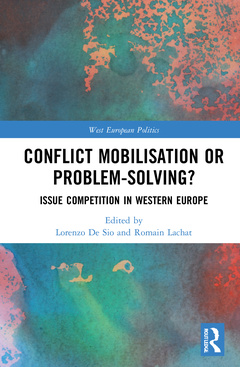Description
Conflict Mobilisation or Problem-Solving?
Issue Competition in Western Europe
West European Politics Series
Coordinators: De Sio Lorenzo, Lachat Romain
Language: English
Subject for Conflict Mobilisation or Problem-Solving?:
Keywords
Valence Issues; West European politics; Twitter Search API; Polarised pluralism; Major EU Member State; 2017 Dutch general election; Associative Issue Ownership; Political space; De Sio; United Kingdom 2017 election; PD Voter; Issue Yield; Highest Issue Yield; Systemic Saliency; Jamaica Coalition; UK’s Nuclear Weapon; Policy Issue; Issue Emphasis; Issue Ownership Theory; UK Political Party; Optimal Policy Issues; Rival Predictors; Issue Goals; General Tobit Model; German Party Competition; West European Party Systems; EU Issue; SNP; EU Enforcement; EU Constraint
Publication date: 09-2023
· 15.6x23.4 cm · Paperback
Publication date: 05-2021
· 15.6x23.4 cm · Hardback
Description
/li>Contents
/li>Readership
/li>Biography
/li>
In the aftermath of disruptive electoral and political developments such as the Brexit referendum and the election of Donald Trump, six important European countries went to the polls between 2017 and 2018. This book presents the results of the Issue Competition Comparative Project (ICCP), which analysed these six elections through a focus on post-ideological issue competition, leveraging a fresh theoretical perspective ? and innovative data collection and analysis methods ? emerging from issue yield theory.
The contributors to this volume cast a new light on electoral developments that have affected Western Europe in recent years, pointing to the key distinction between problem-solvers (parties and leaders that leverage their technocratic competence, and present a consensual, win-win view of contemporary transformations) and conflict mobilizers (that instead invest on the mobilization of conflict emerging from these transformations), as well as to the ability of some actors to mobilize voters across traditional ideological boundaries. In this light, parties commonly identified as "populist" simply emerge distinctively as cross-ideological conflict mobilizers; but mainstream parties appear vital and competitive as well, when they properly identify and leverage their issue advantages. Thus, the fate of democracy in Western Europe does not appear doomed to a triumph of populist appeals, but rather openly depending on the ability of political parties to leverage issue opportunities that emerge from societal demands and needs.
The chapters in this book were originally published as a special issue of West European Politics.
Introduction 1. Research design: from issues to goals 2. The 2017 Dutch general election: how small parties campaigned more strategically 3. Campaigning in an unprecedented election: issue competition in the French 2017 presidential election 4. The United Kingdom 2017 election: polarisation in a split issue space 5. It’s no longer the economy, stupid! Issue yield at the 2017 German federal election 6. Parties’ issue strategies on the drawing board: the 2017 Austrian case 7. The 2018 Italian general election: party strategies in a changing political space 8. Ideology, problem-solving, and conflict mobilization 9. The proof of the pudding: issue yield at the ballot box
Lorenzo De Sio is Full Professor of Political Science at LUISS University, Rome, Italy. He is the Director of the CISE (Italian Centre for Electoral Studies); and the principal investigator of the ICCP (Issue Competition Comparative Project). His current research interests focus on issue dynamics in voting behaviour and party competition.
Romain Lachat is Associate Professor of Political Behaviour at CEVIPOF, the Centre for Political Research, Sciences Po, Paris, France. His research focuses on the comparative analysis of electoral behaviour and on political representation. He is particularly interested in the impact of political institutions and party characteristics on individual-level behaviour.




